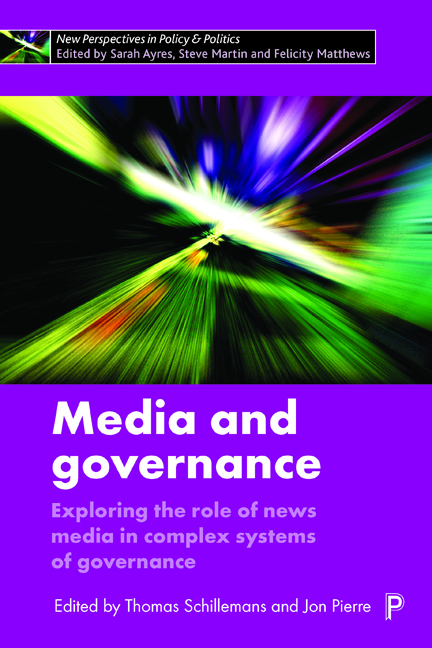Book contents
- Frontmatter
- Contents
- List of figures and tables
- Notes on contributors
- Introduction: Entangling and disentangling governance and the media
- one Governance and the media: exploring the linkages
- two Media and public accountability: typology and research agenda
- three Political control or legitimacy deficit? Bureaucracies’ symbolic responses to bottom-up public pressure
- four Mediatised local government: social media activity and media strategies among local government officials 1989–2010
- five Fighting or fumbling with the beast? The mediatisation of public sector agencies in Australia and the Netherlands
- six The mediatisation of university governance: a theoretical and empirical exploration of some side effects
- seven Managing commercialised media attention in complex governance networks: positive and negative effects on network performance
- eight Over-responsibilised and over-blamed: elected actors in media reporting on network governance. A comparative analysis in eight European metropolitan areas
- Index
Introduction: Entangling and disentangling governance and the media
Published online by Cambridge University Press: 19 April 2022
- Frontmatter
- Contents
- List of figures and tables
- Notes on contributors
- Introduction: Entangling and disentangling governance and the media
- one Governance and the media: exploring the linkages
- two Media and public accountability: typology and research agenda
- three Political control or legitimacy deficit? Bureaucracies’ symbolic responses to bottom-up public pressure
- four Mediatised local government: social media activity and media strategies among local government officials 1989–2010
- five Fighting or fumbling with the beast? The mediatisation of public sector agencies in Australia and the Netherlands
- six The mediatisation of university governance: a theoretical and empirical exploration of some side effects
- seven Managing commercialised media attention in complex governance networks: positive and negative effects on network performance
- eight Over-responsibilised and over-blamed: elected actors in media reporting on network governance. A comparative analysis in eight European metropolitan areas
- Index
Summary
The book
Over the past decades, governments in most developed countries have for a variety of reasons reformed the ways in which public policy is designed and delivered (Pollitt and Bouckaert, 2004; Levi-Faur, 2012). Although the trajectories of change diverge across countries and over time, one recurring element is that many governments have systematically, although generally not programmatically, shifted executive powers and responsibilities away from the congested political-administrative centres of the state toward a host of third parties: nonprofit organisations, privatised state enterprises, networks, transnational and international organisations, semi-autonomous agencies and local governments. This strategy has enabled governments to increase their points of contact with societal actors and stakeholders and to develop networks for service delivery and governance (Peters and Pierre, 1998; Torfing and Sorensen, 2014). It has also meant that more actors – and different kinds of actors – now bear at least some responsibility for public policies. This endows them with a strategic interest in the news media as an arena where their interests can be served and where the credit for success and the blame for failures are distributed (Schillemans, 2012; Hood, 2002).
Alongside these developments in democratic governance, the media sector has undergone at least as significant changes as governance. The 24-hour news cycle, the rise of social media, and a more competitive and more vulnerable economy of news production and delivery have changed the landscape of journalism (Krause, 2011; Djerf-Pierre, 2000). In addition, the practice of journalism has increasingly emphasised critical scrutiny and the imposition of a mediatised format on politics (Mazzoleni and Schulz, 1999; Esser and Stromback, 2014). Meanwhile, the need – or the perceived need – to spin political messages and the ability to manage the blame game has added a new dimension to governing. On the one hand, the role of classical journalistic media has come under pressure, with the rise of social media, the furore surrounding fake news and direct challenges by populist politicians. On the other hand, however, the new social media reality offers opportunities for the traditional media, for instance as new sources of information (Brands et al, 2018) or for the verification of the credibility of sources (Fletcher et al, 2017).
- Type
- Chapter
- Information
- Media and GovernanceExploring the Role of News Media in Complex Systems of Governance, pp. 1 - 12Publisher: Bristol University PressPrint publication year: 2019



